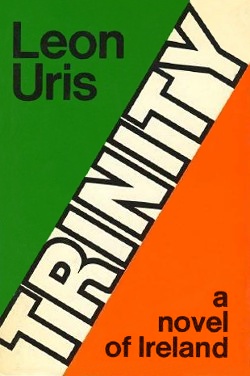
Derry, officially Londonderry, is the second-largest city in Northern Ireland and the fifth-largest city on the island of Ireland. The name Derry is an anglicisation of the Old Irish name Daire meaning "oak grove". The old walled city lies on the west bank of the River Foyle, which is spanned by two road bridges and one footbridge. The city now covers both banks.

The Troubles were an ethno-nationalist conflict in Northern Ireland that lasted about 30 years from the late 1960s to 1998. Also known internationally as the Northern Ireland conflict, it is sometimes described as an "irregular war" or "low-level war". The conflict began in the late 1960s and is usually deemed to have ended with the Good Friday Agreement of 1998. Although the Troubles mostly took place in Northern Ireland, at times violence spilled over into parts of the Republic of Ireland, England, and mainland Europe.

Brian Patrick Friel was an Irish dramatist, short story writer and founder of the Field Day Theatre Company. He had been considered one of the greatest living English-language dramatists. He has been likened to an "Irish Chekhov" and described as "the universally accented voice of Ireland". His plays have been compared favourably to those of contemporaries such as Samuel Beckett, Arthur Miller, Harold Pinter and Tennessee Williams.
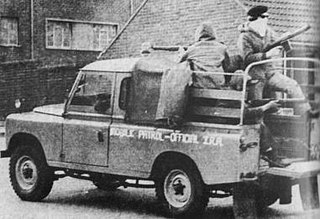
The Official Irish Republican Army or Official IRA was an Irish republican paramilitary group whose goal was to remove Northern Ireland from the United Kingdom and create a "workers' republic" encompassing all of Ireland. It emerged in December 1969, shortly after the beginning of the Troubles, when the Irish Republican Army (IRA) split into two factions. The other was the Provisional IRA. Each continued to call itself simply "the IRA" and rejected the other's legitimacy. Unlike the "Provisionals", the "Officials" did not think that Ireland could be unified until the Protestant majority of Northern Ireland and Catholic minority of Northern Ireland were at peace with each other. The Officials were Marxist-Leninists and worked to form a united front with other Irish communist groups, named the Irish National Liberation Front (NLF). The Officials were called the NLF by the Provisionals, the "stickies" by West Belfast locals, and were sometimes nicknamed the Red IRA by others.
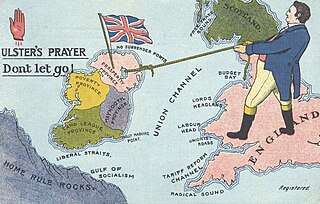
Unionism in Ireland is a political tradition on the island that professes loyalty to the unifying Crown and constitution of the United Kingdom. Once the overwhelming sentiment of a then-ascendant minority Protestant population, in the decades following Catholic Emancipation (1829) it mobilised to oppose the restoration of an Irish parliament. Resurgent as "Ulster unionism", in the century since Partition (1921), its commitment has been to the retention within the United Kingdom of the six Ulster counties that constitute Northern Ireland. Within the framework of a peace settlement for Northern Ireland, since 1998 unionists have reconciled to sharing office with Irish nationalists in a devolved administration, while continuing to rely on the connection with Great Britain to secure their cultural and economic interests.

The Plantation of Ulster was the organised colonisation (plantation) of Ulster – a province of Ireland – by people from Great Britain during the reign of King James I. Most of the settlers came from southern Scotland and northern England; their culture differed from that of the native Irish. Small privately-funded plantations by wealthy landowners began in 1606, while the official plantation began in 1609. Most of the colonised land was stolen from the native Gaelic chiefs, several of whom had fled Ireland for mainland Europe in 1607 following the Nine Years' War against English rule. The official plantation comprised an estimated half a million acres (2,000 km²) of arable land in counties Armagh, Cavan, Fermanagh, Tyrone, Tyrconnell and Londonderry. Land in counties Antrim, Down and Monaghan was privately colonised with the king's support.
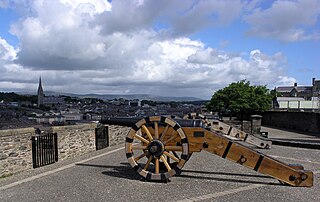
The earliest references to the history of Derry date to the 6th century when a monastery was founded there; however, archaeological sites and objects predating this have been found. The name Derry comes from the Old Irish word Daire meaning 'oak grove' or 'oak wood'.

The Bogside is a neighbourhood outside the city walls of Derry, Northern Ireland. The large gable-wall murals by the Bogside Artists, Free Derry Corner and the Gasyard Féile are popular tourist attractions. The Bogside is a majority Catholic/Irish republican area, and shares a border with the Protestant/Ulster loyalist enclave of the Fountain.

Free Derry was a self-declared autonomous Irish nationalist area of Derry, Northern Ireland, that existed between 1969 and 1972, during the Troubles. It emerged during the Northern Ireland civil rights movement, which sought to end discrimination against the Irish Catholic/nationalist minority by the Protestant/unionist government. The civil rights movement highlighted the sectarianism and police brutality of the overwhelmingly Protestant police force, the Royal Ulster Constabulary (RUC). The area, which included the mainly-Catholic Bogside and Creggan neighbourhoods, was first secured by community activists on 5 January 1969 following an incursion into the Bogside by RUC officers. Residents built barricades and carried clubs and similar arms to prevent the RUC from entering. Its name was taken from a sign painted on a gable wall in the Bogside which read, "You are now entering Free Derry". For six days the area was a no-go area, after which the residents took down the barricades and RUC patrols resumed. Tensions remained high over the following months.

The Battle of the Bogside was a very large communal riot that took place from 12 to 14 August 1969 in Derry, Northern Ireland. The fighting was between residents of the Bogside area, and the Royal Ulster Constabulary (RUC) along with local unionists.
Ivan Averill Cooper was an Irish politician from Northern Ireland who was a member of the Parliament of Northern Ireland, and a founding member of the SDLP. He is best known for leading an anti-internment march which developed into the Bloody Sunday massacre on 30 January 1972, in Derry, County Londonderry, Northern Ireland, after British soldiers opened fire on the crowd.
Seamus Francis Deane was an Irish poet, novelist, critic, and intellectual historian. He was noted for his debut novel, Reading in the Dark, which won several literary awards and was nominated for the Booker Prize in 1996.
This is a chronology of activities by the Provisional Irish Republican Army (IRA) from 1970 to 1979. For actions after this period see Chronology of Provisional Irish Republican Army actions.
Murals in Northern Ireland have become symbols of Northern Ireland, depicting the region's past and present political and religious divisions.

Reading in the Dark is a novel written by Seamus Deane in 1996. The novel is set in Derry, Northern Ireland and extends from February 1945 through July 1971. The book won the 1996 Guardian Fiction Prize and the 1996 South Bank Show Annual Award for Literature, is a New York Times Notable Book, won the Irish Times International Fiction Prize and the Irish Literature Prize in 1997, besides being shortlisted for the Booker Prize in 1996. It has been translated into 20 languages.
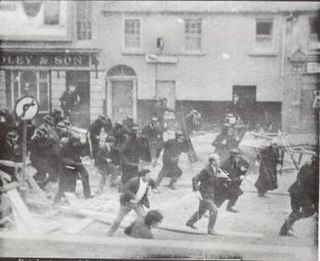
During 12–16 August 1969, there was an outbreak of political and sectarian violence in Northern Ireland, which is often seen as the beginning of the almost thirty-year conflict known as the Troubles. There had been sporadic violence throughout the year arising out of the civil rights campaign, which demanded an end to discrimination against Catholics and Irish nationalists. Civil rights marches had been repeatedly attacked by Ulster Protestant loyalists and also came into frequent conflict with the Royal Ulster Constabulary (RUC), the overwhelmingly Protestant police force.
Events during the year 1969 in Northern Ireland.
The city of Derry, Northern Ireland, was severely affected by the Troubles. The conflict is widely considered to have begun in the city, with many regarding the Battle of the Bogside in 1969 as the beginning of the Troubles. The 'Bloody Sunday' incident of 1972 occurred in Derry, in the Bogside area.
The Northern Ireland civil rights movement dates to the early 1960s, when a number of initiatives emerged in Northern Ireland which challenged the inequality and discrimination against ethnic Irish Catholics that was perpetrated by the Ulster Protestant establishment. The Campaign for Social Justice (CSJ) was founded by Conn McCluskey and his wife, Patricia. Conn was a doctor, and Patricia was a social worker who had worked in Glasgow for a period, and who had a background in housing activism. Both were involved in the Homeless Citizens League, an organisation founded after Catholic women occupied disused social housing. The HCL evolved into the CSJ, focusing on lobbying, research and publicising discrimination. The campaign for Derry University was another mid-1960s campaign.
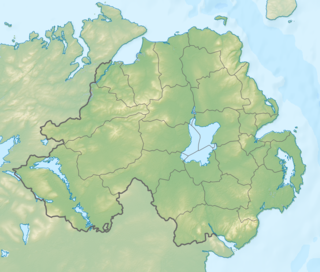
On 20 December 1972, during the height of the Northern Ireland Troubles, a mass shooting took place at the Top of the Hill bar in a small Catholic enclave of the majority Protestant Waterside area of Derry. Five civilians were shot dead by Loyalist paramilitaries from a unit of the Ulster Freedom Fighters (UFF), which is a part of the Ulster Defence Association (UDA). The shooting is also known locally as the "Annie's Bar massacre".
